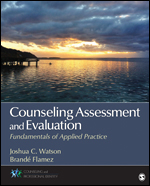Counseling Assessment and Evaluation
Fundamentals of Applied Practice
Joshua Chad Watson - Texas A&M University-Corpus Christi, USA
Brande Flamez - Lamar University, USA
Designed to help students learn how to assess clients, conduct treatment planning, and evaluate client outcomes, this practical book addresses specific CACREP competencies. Incorporating case studies and examples, authors Joshua C. Watson and Brandé Flamez provide foundational knowledge for sound formal and informal assessments, cover ethical and legal considerations in assessment, describe basic statistical concepts, highlight the domains in which assessments are commonly used (intelligence, aptitude, achievement, personality, career, etc.), and provide strategies for integrating assessment data when working with clients.
Counseling Assessment and Evaluation is part of the SAGE Counseling and Professional Identity Series, which targets specific competencies identified by CACREP (Council for Accreditation of Counseling and Related Programs). To learn more about each text in the series, please visit www.sagepub.com/vip/cpiseries.
Available formats
See what’s new to this edition by selecting the Features tab on this page. Should you need additional information or have questions regarding the HEOA information provided for this title, including what is new to this edition, please email sageheoa@sagepub.com. Please include your name, contact information, and the name of the title for which you would like more information. For information on the HEOA, please go to http://ed.gov/policy/highered/leg/hea08/index.html.
For assistance with your order: Please email us at textsales@sagepub.com or connect with your SAGE representative.
SAGE
2455 Teller Road
Thousand Oaks, CA 91320
www.sagepub.com
Password-protected Instructor Resources include the following:
- A Microsoft® Word® test bank is available containing multiple choice, true/false, short answer, and essay questions for each chapter. The test bank provides you with a diverse range of pre-written options as well as the opportunity for editing any question and/or inserting your own personalized questions to effectively assess students’ progress and understanding.
- A Respondus electronic test bank is available and can be used on PCs. The test bank contains multiple choice, true/false, short answer, and essay questions for each chapter and provides you with a diverse range of pre-written options as well as the opportunity for editing any question and/or inserting your own personalized questions to effectively assess students’ progress and understanding. Respondus is also compatible with many popular learning management systems so you can easily get your test questions into your online course.
- Editable, chapter-specific Microsoft® PowerPoint® slides offer you complete flexibility in easily creating a multimedia presentation for your course. Highlight essential content, features, and artwork from the book.
- Chapter-specific discussion questions help launch classroom interaction by prompting students to engage with the material and by reinforcing important content.
The open-access Student Study Site includes the following:
- Mobile-friendly web quizzes allow for independent assessment of progress made in learning course material.
KEY FEATURES:
- The book is organized around and adheres to the new CACREP standards of developing professional identity.
- Case illustrations throughout the book illustrate key points.
- Guided practice exercises, reflection questions, and pre- and post-assessments offer robust pedagogical support for putting assessment skills into practice.
- Clinically relevant material and examples for school counselors demonstrate counseling and assessment in real-world settings.
- Each author has a strong professional counselor identity, furthering the theme of professional development to counseling students as well as advocacy for the profession.
- Online instructor and student (open access) resources provide additional support for the text.

